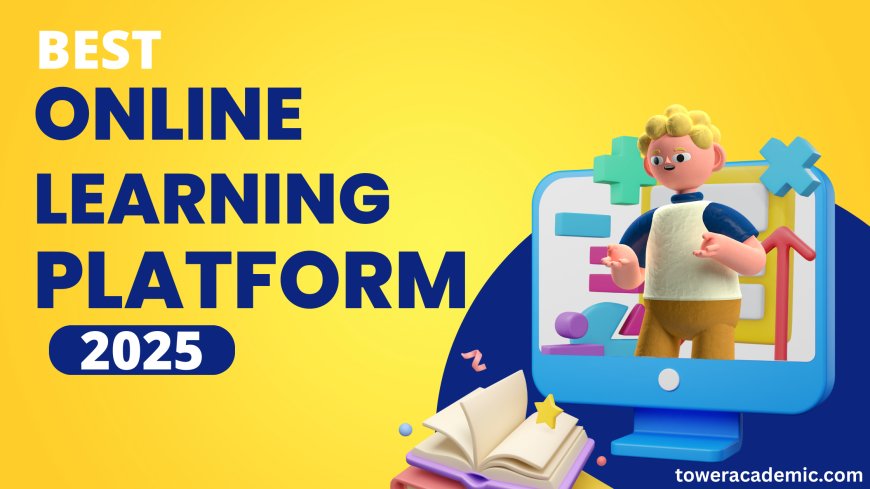Best Online Learning Platforms for Students in 2025
Explore the best online learning platforms for students in 2025—top tools for school, college, and self-paced study across all subjects and skill levels.

Best Online Learning Platforms for Students in 2025 refers to a comprehensive evaluation of various digital education services that are expected to shape the future of learning. As online education continues to expand, driven by advancements in technology and a growing demand for flexible learning options, identifying the best platforms becomes increasingly significant for students and educators alike.
The landscape is notable not only for its variety of course offerings but also for the competitive nature of the platforms, each vying to provide unique features that enhance learning experiences.
The evaluation criteria for online learning platforms encompass several critical as- pects, including user experience, accessibility, course quality, and engagement tools. User-friendly interfaces and mobile compatibility are essential to facilitate learning anytime, anywhere, while features promoting inclusivity ensure that all learners, in- cluding those with disabilities, can participate fully. Furthermore, high-quality course material, regular updates, and interactive elements contribute to effective knowledge acquisition and learner engagement, making these platforms valuable resources in contemporary education[1][2][3].
Prominent online learning platforms, such as Coursera, Udemy, and edX, offer diverse learning paths, from individual courses to professional certificates and degree programs, reflecting a shift towards more personalized and career-oriented edu- cation. Each platform distinguishes itself through unique attributes, pricing models, and content delivery methods, catering to a wide range of learning preferences and goals[4][5]. However, concerns regarding accreditation, the digital divide, and the potential for isolation in online learning environments highlight ongoing challenges that students and institutions must address as they navigate this evolving educational landscape.
Looking ahead, the rise of gamification, personalized learning through AI, and immer- sive technologies is anticipated to redefine online education by 2025. These trends signify a broader movement towards more engaging, interactive, and tailored learning experiences, further underscoring the importance of evaluating and selecting the best online learning platforms for students in an increasingly digital world[6][7][8].
Criteria for Evaluation
The evaluation of online learning platforms is crucial to ensure that they meet the diverse needs of learners and educators. A comprehensive assessment framework can help identify the strengths and weaknesses of various platforms, guiding educa- tional institutions in their selection process.
User Experience
The user experience is a critical factor in determining the effectiveness of an e-learn- ing platform. A user-friendly interface, characterized by intuitive navigation, a clean design, and mobile compatibility, allows learners to focus on their studies without unnecessary distractions[1][9]. The platform should also be responsive and functional across various devices to facilitate learning anytime, anywhere.
Accessibility and Inclusivity
Ensuring accessibility and inclusivity is paramount in the evaluation of online learning platforms. Platforms should comply with relevant privacy regulations and be designed to accommodate diverse learners, including those with disabilities[1][9]. This includes features like adjustable text sizes, screen reader compatibility, and multilingual sup- port to promote educational equity.
Quality of Course Material
One of the primary considerations in evaluating an e-learning platform is the quality of the course material. This includes attributes such as accuracy, organization, and interactivity, which contribute to a rich learning experience. High-quality content should be regularly updated and relevant to ensure learners are receiving current information that supports their educational goals[2].
Engagement Tools
Engagement tools are essential for fostering community and collaboration among learners. Effective platforms should incorporate interactive features, such as dis- cussion forums, live chats, and collaborative projects, which enhance student in- volvement and motivation[2]. Additionally, gamification elements can be used to boost learner engagement by making the learning experience more enjoyable and rewarding[9].
Feedback Mechanisms
Robust feedback mechanisms are vital for continuous improvement and learner development. Platforms should offer diverse assessment options, including quizzes, assignments, and peer reviews, which allow learners to receive timely feedback
Reporting and Analytics
Advanced reporting and analytics capabilities are essential for tracking learner progress and engagement. Platforms should provide detailed insights into learner behavior, knowledge retention, and areas where learners may struggle[1]. Such analytics can inform decisions regarding course adjustments and individualized learning paths, enhancing overall educational outcomes.
Continuous Support and Maintenance
Ongoing support and maintenance are critical to the long-term success of online learning platforms. Reliable customer support, along with self-service options such as FAQs and tutorial resources, ensures that learners can resolve issues quickly and effectively[11][9]. Regular updates and maintenance can further optimize platform performance and usability.
Accreditation
Lastly, accreditation serves as a benchmark for verifying the professionalism and quality of the courses offered. Platforms should have transparent accreditation processes to ensure that only high-quality content is supplied to learners, protecting their interests against potential fraudulent offerings[12].
These criteria collectively contribute to a structured and evidence-based approach to evaluating online learning platforms, allowing institutions to make informed choices that best suit their educational needs.
Top Online Learning Platforms
In recent years, online learning platforms have gained immense popularity due to their flexibility, accessibility, and variety of course offerings. The best platforms
provide powerful, customizable tools for both instructors and students, making them ideal for delivering engaging and effective online courses[4][13]. Below is an overview of some of the top online learning platforms that are highly rated for their unique features and offerings.
1. Coursera
Coursera is one of the largest online learning platforms, boasting over 113 million learners. It partners with more than 300 leading universities and companies to offer a diverse range of courses, professional certificates, and degree programs. Users can choose from hands-on projects or individual courses, and with Coursera Plus, learners can access unlimited courses through a subscription plan[5][13].
2. Udemy
Udemy serves as a global marketplace for online courses, featuring a vast array of topics and instructors. It is designed for learners of all backgrounds, from beginners to advanced users. Courses on Udemy are individually priced, starting at $12.99, making it an affordable option. The platform also supports multiple languages, with courses available in 75 different languages[5][13].
3. edX
edX, which has over 42 million users, offers courses from prestigious universities like Harvard and MIT. It provides various learning paths, including MicroBachelors, MicroMasters, and professional certificates. Most courses can be accessed for free, though official certificates may require a fee. The high-quality content and flexibility make edX a popular choice among learners[5][13].
4. Pluralsight
Pluralsight is particularly suited for those in technology and programming fields. It offers a subscription-based pricing model, providing access to a library of over 7,000 courses. The platform features individual and team plans, with options for a free trial, making it an appealing choice for professionals seeking to enhance their skills[5].
5. Udacity
Focused on technology and career-oriented courses, Udacity offers Nanodegree programs that require a significant commitment but equip learners with job-ready skills. The platform stands out for its free introductory courses and career services, including personalized resume reviews and interview preparation. Although not all certificates are accredited, completion diplomas from Udacity are respected in the job market[5][13].
6. Thinkific
Thinkific is best known for its custom course creation capabilities, making it an excellent choice for instructors looking to develop and sell their own online courses. The platform offers tools to create engaging digital products and is designed to simplify the course delivery process[14][13].
7. MasterClass
MasterClass offers a unique celebrity-powered learning experience, where users can learn from experts in various fields. The platform focuses on providing high-quality content and engaging lessons, making it an attractive option for learners interested in creative and lifestyle subjects[5].
Comparison of Features
When selecting an online learning platform, various features must be considered to ensure it aligns with specific educational goals and preferences. This section outlines the key features that differentiate platforms and their effectiveness in enhancing the learning experience.
Quality and Engagement
A primary consideration for any online learning platform is the quality of the course material. Effective platforms deliver engaging content that is accurate, well-orga- nized, and interactive. Features such as engagement tools are crucial as they foster community and collaboration among learners, enhancing the overall learning experience[2][15]. Moreover, platforms should include a range of assessment tools, including quizzes, assignments, and peer reviews, to facilitate active participation and knowledge retention[3][9].
Feedback and Analytics
An effective platform integrates comprehensive assessment and feedback systems. This includes both formative and summative assessments that measure student progress throughout the learning journey[9]. Furthermore, advanced analytics tools provide insights into learner behavior, enabling organizations to make data-driven decisions regarding content updates and instructional strategies. These analytics can reveal critical information, such as quiz scores and common areas of difficulty, allowing educators to tailor their approach for better engagement[11][16].
Accessibility and Security
Accessibility is vital to ensure educational equity. Platforms must be designed to accommodate diverse learners, providing usability across different devices and set- tings. Features that promote accessibility, such as mobile compatibility and inclusive design, are essential for reaching a broader audience[2][17]. Additionally, security measures, such as secure browsers and IP address-based proctoring, are crucial for maintaining the integrity of online assessments[16][18].
User Experience and Scalability
The user interface of a learning platform significantly impacts both the educator's and students' experiences. Platforms should offer intuitive designs to facilitate smooth navigation, minimizing barriers to engagement[18]. Scalability is another important
factor; platforms must perform well under varying loads to ensure stability during peak usage periods, thereby maintaining a consistent learning environment[9].
Customization and Control
Different users have varying needs regarding course ownership and branding control. Some platforms, like Teachable, offer full control over course design and pricing, allowing for a personalized experience. Conversely, marketplace models may limit access to learners and dictate pricing structures[19][17]. Thus, understanding the nuances of platform ownership can significantly influence the choice of an online learning platform.
Future Trends in Online Learning
The landscape of online learning is undergoing rapid transformation, with emerging technologies poised to redefine educational experiences by 2025. As online learning platforms evolve, they are increasingly becoming more intelligent, interactive, and personalized, catering to the diverse needs of learners globally[6]. This shift reflects a broader trend towards integrating advanced technologies into educational settings, creating dynamic learning environments that enhance engagement and comprehen- sion[7].
Gamification and Interactive Learning
One significant trend is the rise of gamification, where educational content is infused with game-like elements such as points, badges, and leaderboards. This approach transforms learning into an engaging experience, motivating students to participate actively and achieve their goals[8]. Platforms like Kahoot! and Duolingo exemplify the success of gamified learning, reporting higher engagement and course completion rates[8]. Furthermore, interactive tools such as quizzes, polls, and virtual breakout rooms effectively keep students involved, fostering a collaborative learning atmos- phere[20].
Personalized Learning Through AI
Artificial Intelligence (AI) is set to revolutionize online education by creating hy-
per-personalized learning paths tailored to each student's unique needs and learn- ing speeds[21]. Adaptive learning technologies will analyze student performance in real-time, adjusting content and difficulty levels dynamically to ensure optimal learning outcomes[22]. This individualized approach not only enhances retention
but also optimizes learning time, allowing for continuous assessment and feedback, which are crucial for student success[22].
Immersive Learning Experiences
The incorporation of immersive technologies like Virtual Reality (VR) and Augmented Reality (AR) is another emerging trend in online education. These tools provide lifelike
experiences that significantly elevate student engagement by allowing learners to visualize complex concepts and participate in experiential learning activities[20]. For instance, AR applications are already being used in institutions like Arizona State University to teach biology, enabling students to explore human anatomy and cell interactions in vivid detail[20].
Microlearning for Efficient Knowledge Acquisition
Microlearning, which delivers content in bite-sized modules, is gaining traction as a method to accommodate learners' busy schedules and just-in-time knowledge needs. Research indicates that this approach improves information retention compared to traditional methods, making it an effective strategy for skill acquisition[8]. As learning preferences shift towards more concise and focused content, microlearning will likely play a vital role in the future of online education.
The Role of the Metaverse
Looking beyond 2025, the concept of the metaverse is expected to play a critical role in online education. This emerging virtual environment will facilitate immersive and interactive learning experiences, allowing students to engage with content in innova- tive ways. By integrating elements of social interaction and real-world simulations, the metaverse will create opportunities for collaborative learning and community building among students from diverse backgrounds[7].
Challenges and Recommendations
Online learning platforms present several challenges that can hinder the educational experience for students. Understanding these challenges, as well as implementing targeted recommendations, can help improve the overall effectiveness of e-learning environments.
Technical Difficulties
One of the primary barriers to effective online learning is technical difficulties. Many students encounter issues related to inadequate access to technology, unreliable internet connectivity, and user errors such as forgetting passwords or navigating course materials.[23][24] To address these challenges, institutions should develop comprehensive technical support systems, provide alternative access to materials in case of equipment failure, and improve course loading times. Additionally, creating resources such as tutorials and FAQs can help users navigate the platforms more effectively.[25]
Isolation and Lack of Social Interaction
Online learning can lead to feelings of isolation, as students miss the face-to-face interactions typical of traditional classroom settings. This lack of social engagement can diminish the sense of community that is essential for effective learning.[24][26]
To mitigate this issue, educators can foster social interaction through virtual study groups, discussion boards, and live video conferencing sessions. These initiatives can create a more connected learning environment where students feel supported and engaged.[24]
Time Management Challenges
Effective time management is critical for success in online learning, yet many studen- ts struggle to balance their studies with personal responsibilities. Research indicates that poor time management can lead to increased stress and decreased academic performance.[24] Educators can support students by setting clear expectations, providing deadlines for assignments, and conducting periodic surveys to understand students' time allocation. Personalized guidance can then be offered to help students manage their schedules effectively.[24]
Barriers to Access for Students with Special Needs
Students with disabilities or special needs may face additional challenges when engaging in online learning. These barriers can include limited access to necessary technology or learning resources tailored to their needs.[23][26] To create a more inclusive learning environment, online platforms must prioritize accessibility features and ensure that all students have the tools they need to succeed. This may involve offering customized learning pathways that cater to diverse needs and preferences.- [23]
Overreliance on Technology
While technology enhances learning experiences, an overreliance on digital re- sources can impede the development of independent thinking and problem-solving skills.[23] To counteract this, educators should balance technology use with tradi- tional teaching methods that encourage critical thinking. Incorporating elements of gamification and interactive content can also help maintain student engagement while promoting independent learning.[25]
Recommendations for Enhanced Learning
In order to maximize learning outcomes from online education, a comprehensive, criteria-driven framework for evaluating e-learning platforms is recommended.[2] This includes considering factors such as performance tracking tools, content effective- ness reports, certification options, and clear pricing structures.[27][3] By adopting a checklist approach for selecting online learning platforms, educators and institutions can make informed decisions that enhance teaching and learning goals through optimized delivery of engaging content and experiences.[2]
References
[2] : 10 Essential Features of An Online Learning Platform - LinkedIn
[3] : Evaluating E-Learning Platforms: A Comprehensive Checklist ...
[4] : 11 Best Synchronous & Asynchronous Learning Platforms (2025)
[5] : How will education change by 2025 with AI and online learning?
[6] : The Best eLearning Platforms of 2025 - Knowledge Anywhere
[7] : 12 Must-Have Features of an Online Platform for Training ... - Instancy
[8] : Explore best examples of online learning platforms for all use cases
[9] : The 13 Best Online Learning Platforms in 2025 - CareerFoundry [10]: Best Online Learning Platforms in 2025 - Upskillwise
[11] : 22 Best Online Learning Platforms for 2025: Top Web-Based ...
[12] : Top 3 Trends Enhancing Digital Learning Experience in 2025
[13] : Impact of Online Assessments on the education sector in 2025
[14] : Top 9 AI-powered learning platforms revolutionizing elearning in 2025
[15] : Our Selection of Best Online Education Platforms in 2025
[16] : Top 11 Online Learning Platforms 2025 - Teachable
[17] : The Evolution of Online Learning Platforms: What to Expect in 2025
[18] : Top Advances in Learning Technology for Modern Education in 2025
[19] : Top EdTech Trends That Will Shape Online Learning in 2025
[20] : 15 Reasons Why the Future of Education is Online Learning [2025]
[21] : Revolutionizing Education with AI by 2025 - Enfin Technologies
[22] : The Top 12 Adaptive Learning Platforms (2025 Updated) | SC Training
[23] : How Does Technology Impact Student Learning Outcomes?
[24] : Challenges of Distance Learning for Students | National University
[25] : 10 Elearning Challenges + Solutions [2025] - EducateMe LMS
[26] : 7 Top Challenges of Online Learning For Students (and Solutions)
[27] : Top 7 Video Learning Platforms for Online Education in 2025 [Free ...









































